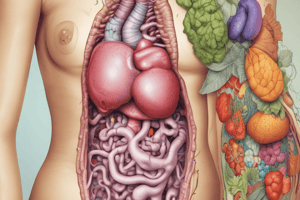Podcast
Questions and Answers
Match the following Crohn’s Disease manifestation with their description:
Match the following Crohn’s Disease manifestation with their description:
General weakness = Feeling of overall body tiredness Anemia = Decrease in red blood cells or hemoglobin levels Increase defecation frequency and amount, bad smell and bright color = Change in bowel habits with foul-smelling and colorful stool Decrease calcium (bone disorder, memory weakness, decrease normal hair grow up especially head) = Symptoms related to calcium deficiency
Match the following Crohn’s Disease nutrition therapies with their recommendations:
Match the following Crohn’s Disease nutrition therapies with their recommendations:
Increase energy = Boosting calorie intake Increase food rich with protein = Eating protein-packed foods Increase food rich with vitamins and minerals = Including nutrient-dense foods in the diet Decrease carbohydrates = Reducing intake of starchy foods
Match the following Crohn’s Disease allowed foods with their categories:
Match the following Crohn’s Disease allowed foods with their categories:
Rice = Permitted grain skimmed cheese = Approved dairy product egg white = Allowed protein source all fruits except Avocado = Fruit varieties that are safe to consume
Match the following Crohn’s Disease disallowed foods with their categories:
Match the following Crohn’s Disease disallowed foods with their categories:
Match the following information about Ileostomy or Colostomy with their descriptions:
Match the following information about Ileostomy or Colostomy with their descriptions:
Flashcards are hidden until you start studying




